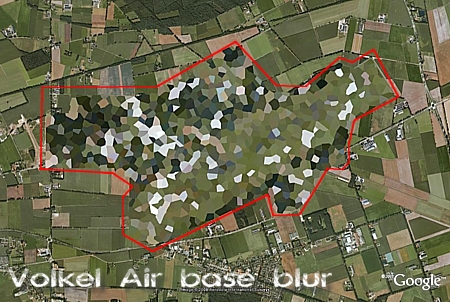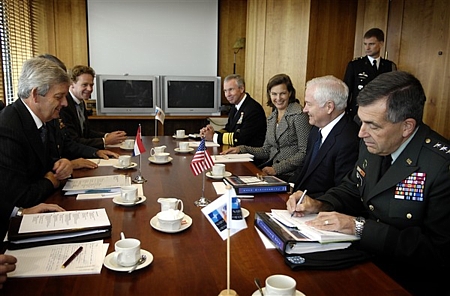Dutch Government Rejects Blue Ribbon Review Findings
 |
| The nuclear base at Volkel is pixeled out on Google Earth (why, Google?). Click on image to download map of the base (note: 1 MB). Image: GoogleEarth (outline and label added) |
.
By Hans M. Kristensen
The Dutch Government today rejected the findings of the U.S. Air Force’s Blue Ribbon Review, saying the safety and security at the nuclear weapons base at Volkel Air Base in the Netherlands “are in good order.”
The Blue Ribbon Review final report in February concluded that “most” nuclear sites in Europe do not meet U.S. safety requirements and that it would take “significant additional resources” to bring them up to standard. The disclosure of the findings has led to calls in some European countries that the remaining tactical nuclear weapons should be withdrawn.
During a meeting earlier today in the Defense Committee of the Dutch Parliament, Defense Minister Eimert van Middelkoop responded to a question from Krista van Velzen (Socialist Party) about the findings of the Blue Ribbon Review:
“Ms. van Velzen asked a question about the American report concerning the storage of nuclear weapons and Volkel. Insofar as this is relevant, safety and security at Volkel are in good order, but the government of the Netherlands does not make any announcements concerning the presence or absence of nuclear weapons embodying that single Dutch nuclear mission.” (unofficial translation)
|
Figure 1: |
 |
| Dutch Defense Minister Eimert van Middelkoop (left) met with U.S. Defense Secretary Robert Gates in October 2007. Afghanistan was on the agenda, but isn’t it time to talk about the withdrawal of U.S. nuclear weapons from Europe? |
.
Although Mr. Middelkoop refused to confirm or deny whether there are nuclear bombs at the base, he did confirm that the Netherlands still has a nuclear mission. It would have been more interesting to hear his explanation for why that mission is still needed. The enemy is gone, the weapons would take “months” to ready for strike, and the U.S. Air Force would like to see the weapons withdrawn. The deployment increasingly looks like nuclear social welfare for a small group of NATO bureaucrats.
There are an estimated 10-20 U.S. B61 nuclear bombs stored at Volkel Air Base for delivery by Dutch F-16 fighter jets, part of an arsenal of approximately 200 nuclear bombs at six bases in five European countries.
Previous reports: USAF Report: “Most” Nuclear Sites in Europe do not Meet US Security Requirements (FAS, June 2008) | U.S. Nuclear Weapons Withdrawn From the United Kingdom (FAS, June 2008) | United States Removes Nuclear Weapons from German Base, Documents Indicate (FAS, July 2007) | U.S. Nuclear Weapons in Europe (NRDC, 2005)
Successful NC3 modernization must do more than update hardware and software: it must integrate emerging technologies in ways that enhance resilience, ensure meaningful human control, and preserve strategic stability.
The FY2026 National Defense Authorization Act (NDAA) paints a picture of a Congress that is working to both protect and accelerate nuclear modernization programs while simultaneously lacking trust in the Pentagon and the Department of Energy to execute them.
While advanced Chinese language proficiency and cultural familiarity remain irreplaceable skills, they are neither necessary nor sufficient for successful open-source analysis on China’s nuclear forces.
Satellite imagery has long served as a tool for observing on-the-ground activity worldwide, and offers especially valuable insights into the operation, development, and physical features related to nuclear technology.